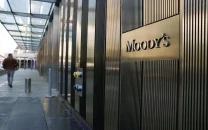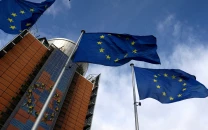Companies scramble to protect market share from global giants
Cheetay.pk plans to make inroads into difficult market segments like grocery delivery, cosmetics and health care

Pakistan’s e-commerce market is currently estimated to be worth around $600 million and this market’s annual growth stands at a gigantic 300% compared to average 8.2% rise in the traditional retail market. PHOTO: REUTERS
Cheetay.pk, a Lahore-based e-commerce and logistics company, is one such company that is trying to grab a share in new market segments by targeting difficult categories like cosmetics, pharmaceuticals, other healthcare products and food delivery.
Pakistan’s e-commerce market size set to cross $1b this year
The company’s management is also looking to enter the grocery delivery area in September this year from Lahore.
“We deliberately have picked the hardest categories to prepare ourselves for upcoming challenges,” said Ahmed Khan, Chief Executive Officer and Co-founder of Cheetay.pk, in an interview with The Express Tribune.
“You have to work really hard and smart in categories like groceries where the ticket size is lower by creating value like that of India where Amazon and Bigbasket are successfully operating in this category.”
As Pakistan’s e-commerce market has opened itself for international players, the domestic players are excited as well as a little worried due to dynamics of the country’s markets.
“Global players bring investments, technology and expertise with them which is a good omen for our e-commerce market as our society is going towards consumerism due to much more awareness and access to products,” Khan said.
Seeing growth potential, retailers invest more in e-commerce
However, he added, local manufacturing was deteriorating gradually except for the fashion and apparel business, which was not a positive thing for domestic players as global companies would bring more product varieties, which would further hurt the local manufacturing sector.
“Pakistan really needs to promote its local services industry, else we may become a spending economy,” Khan cautioned.
Pakistan’s e-commerce market is currently estimated to be worth around $600 million and, according to Khan, this market’s annual growth stands at a gigantic 300% compared to average 8.2% rise in the traditional retail market.
He put the number of e-commerce transactions per day in Pakistan at around 0.5 million, which once stood at only about 500.
Khan suggested that small companies in Pakistan could survive by increasing and training their manpower and pouring more investments. “Our markets are price-sensitive and if local companies want to compete with global giants, they really need to upgrade themselves.”
Khan’s company raised $750,000 in seed money and started operations from Lahore in early 2016. Its next destination is Islamabad, but inroads into Karachi require more investment.
Now, he said, a new era of technology was emerging in the shape of 5G services where virtual realities in retail would matter.
After initial success, Popinjay fails to achieve economies of scale
“I believe that Pakistan is at least three years behind in terms of e-commerce growth; look at India it is many times bigger than us in terms of population whereas it is 1,000 times bigger in e-commerce,” he said, adding the Indian e-commerce market could be gauged by comparing the number of advertisements with those in Pakistan.
4G broadband services have created the difference for Pakistan and when 5G will enter the market, retailers will be able to utilise it in 3D imaging, virtual realities, etc. “So, we should get prepared well in advance,” Khan said.
By 2025, technology would lead Pakistan, he said and cited the example of telecom companies and banks that were creating a new position of chief digital officer, the only post that would allow the person to become CEO of the company later. “The government should also adopt this model for future needs,” he said.
Published in The Express Tribune, June 15th, 2018.
Like Business on Facebook, follow @TribuneBiz on Twitter to stay informed and join in the conversation.



















COMMENTS
Comments are moderated and generally will be posted if they are on-topic and not abusive.
For more information, please see our Comments FAQ